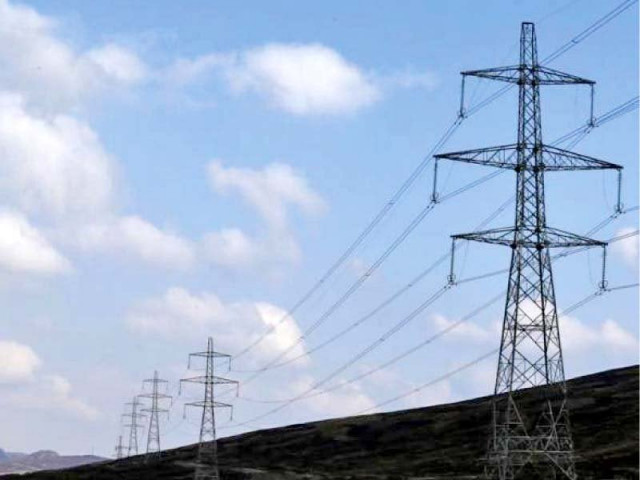Amnesty scheme: Power defaulters to enjoy 30% 'discount' on arrears
Also approves Power Purchase Agreements with IPPs; doubles regulatory duties on import of sugar from 20% to 40%

PHOTO: REUTERS
The amnesty scheme, approved by the Economic Coordination Committee (ECC) of the Cabinet, is supposed to provide an attractive settlement package to defaulters who currently owe the state billions.
The Ministry of Water and Power proposed to the ECC that electricity dues of defaulters should be waived off by half if they pay their bills before the end of July. For those who pay their bills in August, the ministry had proposed 40% waiver, whereas for the ones who settle their arrears in September, it suggested a 30% waiver.
However, the ECC approved only a 30% rebate for those who clear their dues until July; 25% for those who clear their bills in August and 20% for those who pay the dues by September this year.
Moreover, the ECC has also proposed a five per cent reward for officials of power distribution companies for recovery of dues, and 10% for Federal Investigation Agency and police for helping in recovering the outstanding arrears.
The committee decided that if the defaulters did not clear their dues by September, their cases would be sent to National Accountability Bureau for recovery.
Private sector’s power dues have mounted up to Rs382.7 billion, which indicates weakening of the state’s writ. In its summary, the Ministry of Water and Power told the ECC that out of Rs382.7 billion, an amount of Rs181.8 billion could be recovered as a result of the amnesty scheme. Major defaulters in the private sector are industrial consumers.
The non-payment of power dues is one of the main reasons behind the continuous inter-corporate power sector debt.
According to a World Bank report on monitoring implementation of $600 million energy sector reforms loan, by March this year, bill collection stood at 88.5%, only a slight 2.5% rise from levels in June 2013. The remaining 11.5% adds into the country's mounting circular debt each month.
The ECC also approved Power Purchase Agreements (PPA) with Independent Power Producers, which were set up during the Pakistan Peoples Party-led government, but struck were down by the Supreme Court of Pakistan. It allowed signing PPA for buying 150 MW.
Read: Repercussions: Power companies take flak for eating up billions
Further, the committee doubled the rate of regulatory duties on import of sugar from 20% to 40%, a move aimed at protecting sugar barons at the expense of consumers.
The decision will force consumers to buy domestically-produced sugar at a high cost of Rs60 per kg, whereas imported sugar would cost Rs35 per kg.
In order to protect sugar mill owners, who mostly are politicians belonging to mainstream political parties; the ECC also imposed 20% additional regulatory duties on import of sugar. In November last year it had also imposed 20% regulatory duty on import of sugar and denied the benefits of cheap commodity to the consumers.
Further, it the committee has so far given Rs1.6 billion worth of subsidies to international consumers on export of sugar. In November, the ECC had allowed the export of surplus 500,000 tonnes of sugar at subsidised rates.
Read: Desperate govt to offer 50% rebate on payment of old bills
The ECC also increased the regulatory duty on import of wheat from 25% to 40%, as prices of the commodity in international market have further plunged. The cost of imported wheat is Rs23 per kg.
It also extended the wheat and wheat flour export period for Sindh and Punjab to July 31, 2015, with the instructions that export process be completed within 30 days beyond this date.
The meeting deliberated on a proposal submitted by the Ministry of Defence for issuing sovereign guarantee to procure six Maritime Patrol Vessels(MPVs) for the Pakistan Maritime Security Agency(PSMA) on soft loan basis at a cost of Rs1.387 billion (USD 135 million).
The ECC approved the motion, and now the EAD, Finance Division and State Bank will take measures for issuing a guarantee to bid-winner China Shipbuilding & Trading Company Ltd (CSTC).
The body also approved a proposal from the Privatization Commission to release Rs64 million to the Pakistan Machine Tool factory to pay two months salary to workers.
On another proposal from the Privatization Commission, the ECC approved payment of two months (January-February 2015) salaries to the employees of Pakistan Steel Mills(PSM) and also asked PSM to give a clear road map regarding its working so that a decision about its future status could be made accordingly.
The ECC also extended a subsidy to Balochistan for two years from December 1, 2014 to December 31, 2016, for agri-consumers in the province.



















COMMENTS
Comments are moderated and generally will be posted if they are on-topic and not abusive.
For more information, please see our Comments FAQ